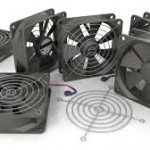Why is My Car Overheating
 Ahhhh, I get this question all the time.
Ahhhh, I get this question all the time.
Ok, there are a few things we need to narrow down and rule out to help you solve your overheating problems.
1. When does the car overheat? If overheating is usually when at idle speeds for a long time then the electric radiator cooling fan is what I would look at first. (actually second, I ALWAYS want to start my diagnosis by checking the level of antifreeze inside the radiator). If the coolant level is LOW, then get a pressure test of the cooling system to help you locate the leak.
That electric cooling fan should be coming on for a while and then go off as the engine warms up. So, open the hood and let the engine idle for a while and when the temp gauge moves over the normal area check to see if the electric fan at or on the radiator comes on. It should.
If the radiator cooling fan is not coming on, take a broom stick and gently nudge the fan blades to see if that will kick start the fan. If not, take the broom stick and whack on the back of the fan motor itself. If it starts with either scenario you most likely need a new fan motor.
If it does not start, you might have lost power to the fan motor or the coolant sensor is not giving accurate information to the fan to come on. You COULD also still have a bad fan motor and the kick start broom stick was not enough to get it to operate.
Check the power to the fan motor, check fuses, check fan relay, check circuits and grounds for the fan to see if there is power loss somewhere.
If overheating is at high speeds or mostly on the freeway, then I would look for a restriction in the radiator first. (actually first…you guessed it, check coolant level in the radiator)
When dirt,rust and mineral deposits build up, they accumulate towards the bottom section of the radiator and it cuts off coolant circulation to the engine. Like trying to run a marathon with your mouth closed and only breathing out of your nose. You can nose walk just fine, but to run fast and over long distances you need more air.
Feel the upper and lower radiator hoses when the engine is running hot, they should be about the same temperature. If one is colder, then a restriction is probably taking place.
Flushing the radiator does nothing really, the restriction at the bottom is caked on and will require a new radiator or a radiator shop to take it apart and “boil it out” in an acid vat.
There are other sources of engine overheating, and I made this video to talk about them and help you rule things out and narrow down the culprit. Take a watch now, share and like with your friends if you found this helpful.
Please share this with your friends,
Austin Davis
